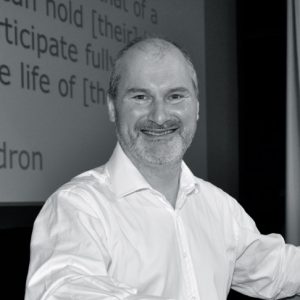Where a system of ‘care’ often turns into one of ‘control’, does inclusion mean people should fit in with the world or that the world should fit around them? asks Simon Duffy
Studying political philosophy at university, I learned about the powerful ideals that have driven people over the centuries to change the world.
Socialists want to live in a world without exploitation, fascists want power and glory, and liberals want freedom while conservatives want things to stay the same. While each backs up their ideals with arguments, they believe that their particular vision is obviously attractive. See it and you’ll believe it.
When I began working with people with learning difficulties, I discovered a world divided by conflicting ideals – but rather different ideals. Some people believed in a world of “care”, where some people took care of other people, often by placing them in strange, institutional worlds. Others, like Wolf Wolfensberger, argued that people with disabilities should not be shut off inside institutions; but instead should join the real world, the mainstream world (Wolfensberger, 1975).
Danger in being ‘too special’
Wolfensberger showed that the world of “care” – which can sound nice in theory – was very dangerous in practice. People who are treated as special, and are then placed in special places, quickly become far too special. Situations deteriorate, people are forgotten, treated as a burden, neglected, abused or worse. Institutions are dangerous places. They don’t need more regulation – they need closing down.
For these reasons, many people worked hard to help people leave institutions following Wolfensberger’s guidance.
However, these ideals sometimes appeared to take people to some very strange places. They even sometimes seemed to justify extreme bossiness: don’t gather in groups, don’t wear the wrong clothes, behave in the right way.
The motives for all this bossiness were often very idealistic, but often it didn’t feel right to me. Should I change myself to fit the world or should the
world change to fit me? Who wants to fit in anyway?
Certainly, my friends in punk band Pertti Kurikan Nimipäivät – also known as PKN – whose four members have learning disabilities, don’t want to fit into mainstream Finnish society, as lovely as that is. They want to stir things up,
live life their own way and help start a revolution.
They have been at the forefront of a movement in Finland telling people that people with disabilities are “Not for Sale”, for example. This is challenging a social care system that uses competitive tendering, which they argue means people with disabilities who need help and support do not have choice and control over their own lives. They are sick of people bossing them around
and selling them off like slaves to the lowest bidder.
Although Wolfensberger has much to teach us still, I found true inspiration from the thoughts of John O’Brien, academic and fellow of the Centre
for Welfare reform. His vision of society – a world of human rights, of freedom
and of inclusion – makes my heart sing in a way that is missing from both the frightful world of “care” and from the technology of “normalisation” created
by Wolfensberger.
Inclusion is a more rewarding vision of society, partly because it respects the need we all have to find our own path and our own role in a society that welcomes us for who are.
In my own work, I’ve tried to build a bridge between the ideal of inclusion and the traditional world of political philosophy.
Jeremy Waldron, who was one of my teachers, wrote: “Above all, I think the idea of citizenship should remain at the centre of modern political debates about social and economic arrangements. The concept of a citizen is that of a person who can hold their head high and participate fully and with dignity in the life of their society.”
This seems to me a very helpful beginning. Instead of trying to fit people into society, we should make a society where everyone fits, where everyone can flourish and live with dignity.
This is an inspiring vision not just for people with disabilities and their allies but also for refugees, people in poverty, those facing discrimination – in fact all of us.
This is why many of us have come together to form Citizen Network. This
is a global community for all who believe in equal citizenship and inclusion for
all – all those who want to look beyond appearances and ensure everyone
is valued. www.citizen-network.org
Simon Duffy is director of the Centre for Welfare Reform and secretary to the international cooperative the Citizen Network

